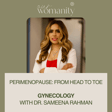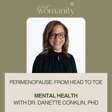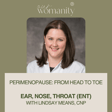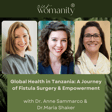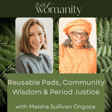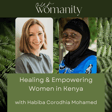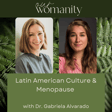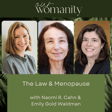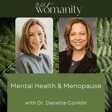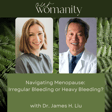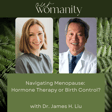Become a Creator today!Start creating today - Share your story with the world!
Start for free
00:00:00
00:00:01

15. Why I Care About Women's Health?
September is Menopause Awareness Month!
Why am I passionate about menopause, women's health, and obstetric fistulas?
Listen to the end to get the full picture.
Transcript
Introduction: Medical Anthropology and Influences
00:00:00
Speaker
I was sitting in a chair with a pulse oximeter on my finger and EKG leads on my chest. My professor was standing next to me with a clipboard in her hand and she asked me what I was going to focus my senior year thesis on. I was an anthropology student. I was at Case Western Reserve University and I loved medical anthropology.
00:00:21
Speaker
There was something so inspiring to me about it. I love the culture. I love the medical aspect. I loved the international component and learning about people around the world. I told her that I really cared about women's issues, especially childbirth.
Exploring Ethiopian Women's Health Challenges
00:00:37
Speaker
Obstetrics was something that really called to me. And I had taken a course with Dr. Robbie Davis Floyd, who has pretty big name in medical anthropology when it comes to women's anthropology and obstetrics and the history and anthropology thereof. And I told her I was really interested in sub-Saharan Africa. So she started telling me about her research. She was doing research in Ethiopia, studying high altitude populations. And I was serving as a control study for her there in Cleveland. That's why she had this pulse oximeter on me, this whole getup. I was a control person, right? Not living in high altitude setting. So she was taking my vitals. So she told me about the issue of obstetric fistula, asking if I'd ever heard of it. And no, I hadn't. So she told me how women in rural parts of Ethiopia have to walk miles and miles and miles, sometimes days before they can reach a hospital where they could safely have their babies. And because of this, the women who would need a C-section because the baby is too large for their pelvis to be delivered vaginally, they needed a C-section and they had to walk days to get one. They ended up with this issue, which was called a fistula, which is a hole between the vagina, between the bladder. I would make that woman incontinent of urine and sometimes a feces if it extended into her rectum. She said then, but we have to stop talking about it because your heart rate just spiked and you're going to skew my data.
Career Shift to Obstetrics and Fistula Surgery
00:02:05
Speaker
Something called me that day. I felt like this was an important women's issue. How could there be women in this world who could not get a C-section and needed to walk two or three days in order to get medical care? I couldn't believe that this existed and that there was actually surgery that fixed this issue. I wasn't the best in my medical class. you know I wasn't the top student, but I felt like this was something that I could make a difference in.
00:02:35
Speaker
I could figure out how to prevent fistulas by learning obstetrics, and I could figure out how to fix fistulas through surgical techniques, which are gynecological. So it was settled. I was already interested in women's issues and obstetrics, and I was going to become an OB-GYM.
00:02:51
Speaker
I then found myself in the operating room doing fistula repairs, watching probably hundreds of them before my surgical mentors really entrusted the scalpel to me and allowed me to do the repairs myself because it is not necessarily an easy surgery and it's not something.
00:03:08
Speaker
that should be taken lightly as these women really are relying on that first repair to heal them. The thing that struck me about these women is that they were told in their communities and their villages, because this mostly happens to women living in rural parts of Sub-Saharan Africa or Southeast Asia, that they were cursed.
00:03:27
Speaker
and that they had brought these fistulas upon themselves. 90% of the time they lost the baby in the process of this and so they were left without their child that they were expecting and they were left incontinent and now they were either ostracized by their communities or actually themselves aside because they were so embarrassed, mostly because of the smell of the urine that they are constantly leaking because of the fistula. The most amazing thing for me though, when I started working in a fistula hospital full time, I was in Malawi, was seeing one of these young women walk into the fistula ward and see 30 other women who had the exact same issues that she did. I could see in her facial expression the realization that no, she was not cursed. This was a medical condition that was preventable and it's fixable. And there are all these other women who have gone through the exact same thing that she has.
Return to Ohio: Focus on Menopause and Women's Health Empowerment
00:04:22
Speaker
And she just needs to have surgery, recover, and then she could go on with her life. I came back to Cleveland, Ohio after years of working in Sub-Saharan Africa, and I started to see the same facial expression. I started to hear the same stories of isolation. A woman sitting in front of me in clinic.
00:04:41
Speaker
would tell me about her disturbed sleep because of hot flashes, the painful sex she was experiencing because of vaginal dryness, and oftentimes the strain on her relationships because of that. She oftentimes ended up getting divorced or breaking up in her relationships because of those issues. She didn't feel like herself and she didn't know where to go for help. I started a group with two of my colleagues called the menopause retreat.
00:05:07
Speaker
because we kept getting questions about menopause and our co-workers were inviting us to their homes to talk to their friends about menopause. Room after room.
00:05:18
Speaker
30 women at a time would spend three hours with us just to talk about this stage of life that all women have gone through since the beginning of time. Yes, women are living way longer than ever before during the stage of menopause or post-menopause, but this is not something new. We are just finally recognizing it and empowering women to get help and to get answers and information through it. I couldn't believe that yes, in 2024, women are still getting fistulas and they're still being ostracized. But in the US, there are still women who are learning about their bodies and being told to stay quiet or really not encouraged to get solutions. I guess because of the patriarchy, really. So that's why I care. I see the same situation of women living in isolation
00:06:05
Speaker
because of all of these different things where people are just not talking about the human body, talking about the woman's body. And my goal is to help women come out of isolation, find community, whether that's with each other, whether that's through healthcare providers, but I want them to be able to move on to their lives and do what they want to do with their lives and not have to be trapped with their medical conditions.




